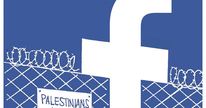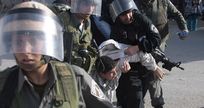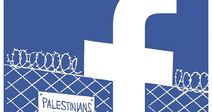22 oct 2016

By: Refaat Alareer
Facebook continues to disable Palestinian pages, as several administration accounts and two pages have been deleted recently, according to Palestinian activists.
Last week, administrators from the Palestinian Information Centre (PIC) Facebook page in Arabic reported that at least 10 accounts were suspended, seven permanently and three temporarily. The PIC has more than two million followers.
When contacted for an explanation, Facebook responded by saying: "Your account has been permanently disabled for not following Facebook Community Standards. We will not reactivate it for any reason."
But according to PIC's general director, Yahya Abu Hassan, the Facebook Community Standards are just a pretext. "Whatever these standards are, they remain loose, arbitrary and moody. However, Facebook clearly uses them as a sword to delete whichever material gets reported to them by the Israelis, thus reminding us of the worst censorship by dictators across time and place."
On Monday, PIC's Facebook page in English, which has more than 200,000 likes, had one of its videos removed by Facebook under the pretext that it had "nudity".
"[The page] posts news stories, reports, features, pictures, cartoons and videos exclusively about Palestine and Palestinians," said Rami Salaam, the page's main administrator.
"The video is motivational. It's about a Palestinian college graduate who is defying the Israeli siege and unemployment by selling flowers. It sends a message to occupied and besieged Palestinians that there is still a ray of hope," Salaam told Al Jazeera. "I have had my accounted temporarily suspended for no reason a number of times before. It's frustrating and, worse, it is distracting."
Last September, Facebook disabled several Palestinian accounts on the basis that they breached community standards. Four editors from the Shehab News Agency, which has more than 6.3 million likes on Facebook, and three executives from the Quds News Network, with about 5.1 million likes, reported they could not access their personal accounts. Both agencies cover daily news in the occupied Palestinian territories.
Palestinians and pro-Palestine activists tried to counter the crackdown with a campaign on social media using the hashtag #FBcensorsPalestine. Thousands interacted with the campaign, generating tens of thousands of tweets and posts.
Coming under pressure, Facebook apologised and reactivated the accounts. However, the social media giant has been singling out Palestinian pages one at a time, say activists, who allege that the crackdown is the result of an agreement between Facebook and Israel.
Last September, a Facebook delegation met Israeli Justice Minister Ayelet Shaked and Public Security Minister Gilad Erdan to "improve cooperation against incitement to terror and murder", according to a statement from the prime minister's office. Shaked, of the right-wing, settler-supported Jewish Home party, hailed the meeting as a success.
Several Israeli press reports suggested that Facebook and the Israeli government would set up "joint teams" to counter online incitement, but no further details were provided.
A spokesperson for the social network told Al Jazeera in a statement at the time that the visit was "part of an ongoing dialogue with policymakers and experts around the world to keep terrorist content off our platform and support counter-speech initiatives".
While Palestinian activists say they are frustrated about being silenced by Facebook, some are still determined to pursue their activism for Palestine on the service.
"Facebook is an important platform. We can't just leave it because of its repressive policies against Palestinians," said Bayan Mohammed, PIC's main Arabic page administrator, whose account was permanently disabled.
"We will continue posting. We will create more accounts and pages to make sure Palestine's voice is heard loud and clear," he told Al Jazeera.
Other activists say that they are working on finding another platform that guarantees freedom of speech to all, to put an end to what renowned Palestinian novelist Susan Abulhawa referred to as "digital dictatorship".
Source: Al Jazeera
Facebook continues to disable Palestinian pages, as several administration accounts and two pages have been deleted recently, according to Palestinian activists.
Last week, administrators from the Palestinian Information Centre (PIC) Facebook page in Arabic reported that at least 10 accounts were suspended, seven permanently and three temporarily. The PIC has more than two million followers.
When contacted for an explanation, Facebook responded by saying: "Your account has been permanently disabled for not following Facebook Community Standards. We will not reactivate it for any reason."
But according to PIC's general director, Yahya Abu Hassan, the Facebook Community Standards are just a pretext. "Whatever these standards are, they remain loose, arbitrary and moody. However, Facebook clearly uses them as a sword to delete whichever material gets reported to them by the Israelis, thus reminding us of the worst censorship by dictators across time and place."
On Monday, PIC's Facebook page in English, which has more than 200,000 likes, had one of its videos removed by Facebook under the pretext that it had "nudity".
"[The page] posts news stories, reports, features, pictures, cartoons and videos exclusively about Palestine and Palestinians," said Rami Salaam, the page's main administrator.
"The video is motivational. It's about a Palestinian college graduate who is defying the Israeli siege and unemployment by selling flowers. It sends a message to occupied and besieged Palestinians that there is still a ray of hope," Salaam told Al Jazeera. "I have had my accounted temporarily suspended for no reason a number of times before. It's frustrating and, worse, it is distracting."
Last September, Facebook disabled several Palestinian accounts on the basis that they breached community standards. Four editors from the Shehab News Agency, which has more than 6.3 million likes on Facebook, and three executives from the Quds News Network, with about 5.1 million likes, reported they could not access their personal accounts. Both agencies cover daily news in the occupied Palestinian territories.
Palestinians and pro-Palestine activists tried to counter the crackdown with a campaign on social media using the hashtag #FBcensorsPalestine. Thousands interacted with the campaign, generating tens of thousands of tweets and posts.
Coming under pressure, Facebook apologised and reactivated the accounts. However, the social media giant has been singling out Palestinian pages one at a time, say activists, who allege that the crackdown is the result of an agreement between Facebook and Israel.
Last September, a Facebook delegation met Israeli Justice Minister Ayelet Shaked and Public Security Minister Gilad Erdan to "improve cooperation against incitement to terror and murder", according to a statement from the prime minister's office. Shaked, of the right-wing, settler-supported Jewish Home party, hailed the meeting as a success.
Several Israeli press reports suggested that Facebook and the Israeli government would set up "joint teams" to counter online incitement, but no further details were provided.
A spokesperson for the social network told Al Jazeera in a statement at the time that the visit was "part of an ongoing dialogue with policymakers and experts around the world to keep terrorist content off our platform and support counter-speech initiatives".
While Palestinian activists say they are frustrated about being silenced by Facebook, some are still determined to pursue their activism for Palestine on the service.
"Facebook is an important platform. We can't just leave it because of its repressive policies against Palestinians," said Bayan Mohammed, PIC's main Arabic page administrator, whose account was permanently disabled.
"We will continue posting. We will create more accounts and pages to make sure Palestine's voice is heard loud and clear," he told Al Jazeera.
Other activists say that they are working on finding another platform that guarantees freedom of speech to all, to put an end to what renowned Palestinian novelist Susan Abulhawa referred to as "digital dictatorship".
Source: Al Jazeera
20 oct 2016

Defence Children International Palestine (DCIP) documented, in a statement issued Thursday, the use of administrative detention against 19 Palestinian children since the outbreak of Jerusalem Intifada in October 2015.
Six of them remain in administrative detention over Facebook posts, including two that have since turned 18 years old, according to the group.
Eleven of the children have been released without charge after spending between three and eight months in jail. Two have been charged, convicted, and imprisoned after three months in administrative detention.
Prior to October, Israel had not held a Palestinian child from the West Bank under administrative detention since December 2011.
Israeli authorities rely on the Emergency Powers Law to authorize the use of administrative detention in Jerusalem. In October 2015, Israel used administrative detention against Palestinian children from East Jerusalem for the first time.
Israel has the dubious distinction of being the only country in the world that systematically prosecutes between 500 and 700 children in military courts each year that lack fundamental fair trial rights.
International juvenile justice standards, which Israel has obliged itself to implement by ratifying the UN Convention on the Rights of the Child (CRC) in 1991, demand that children should only be deprived of their liberty as a measure of last resort and must not be unlawfully or arbitrarily detained.
DCIP considers all persons below the age of 18 to be children in accordance with the CRC.
DCIP quoted Ahmad H., 17, as recalling his first interrogation at Ofer military prison on August 1, “they asked for my Facebook password.”
“I told [the interrogator] of my arrest earlier in April 2016 for 10 days, when I was interrogated [at Shikma prison] in Ashkelon about my Facebook account. I told him I deleted everything upon my release and the account is clean. I told him to check it.”
Ahmad told DCIP that his interrogator at that point accused him of “obstructing the interrogation, claiming that I had asked someone to delete the photos, but I denied it.”
The interrogation lasted one hour, during which he had no parent present or access to legal counsel, according to the statement.
On August 7, Ahmad was interrogated again, this time for three hours.
“[The interrogator] kept questioning me about posting inciting pictures on my Facebook account. I told him I had not posted anything after my release and I had not asked anyone to delete the ones I had posted.”
Three days later, on August 10, Israeli authorities placed Ahmad under administrative detention for six months.
“Israeli authorities must immediately stop using administrative detention against Palestinian minors,” said Brad Parker, attorney and international advocacy officer at DCIP. “Inability to file charges against children due to lack of evidence should never be grounds for holding them indefinitely without charge or trial.”
In the same context, a Palestinian rights group has documented the arrest of 2,155 Palestinians children since the outbreak of Jerusalem Intifada.
Six of them remain in administrative detention over Facebook posts, including two that have since turned 18 years old, according to the group.
Eleven of the children have been released without charge after spending between three and eight months in jail. Two have been charged, convicted, and imprisoned after three months in administrative detention.
Prior to October, Israel had not held a Palestinian child from the West Bank under administrative detention since December 2011.
Israeli authorities rely on the Emergency Powers Law to authorize the use of administrative detention in Jerusalem. In October 2015, Israel used administrative detention against Palestinian children from East Jerusalem for the first time.
Israel has the dubious distinction of being the only country in the world that systematically prosecutes between 500 and 700 children in military courts each year that lack fundamental fair trial rights.
International juvenile justice standards, which Israel has obliged itself to implement by ratifying the UN Convention on the Rights of the Child (CRC) in 1991, demand that children should only be deprived of their liberty as a measure of last resort and must not be unlawfully or arbitrarily detained.
DCIP considers all persons below the age of 18 to be children in accordance with the CRC.
DCIP quoted Ahmad H., 17, as recalling his first interrogation at Ofer military prison on August 1, “they asked for my Facebook password.”
“I told [the interrogator] of my arrest earlier in April 2016 for 10 days, when I was interrogated [at Shikma prison] in Ashkelon about my Facebook account. I told him I deleted everything upon my release and the account is clean. I told him to check it.”
Ahmad told DCIP that his interrogator at that point accused him of “obstructing the interrogation, claiming that I had asked someone to delete the photos, but I denied it.”
The interrogation lasted one hour, during which he had no parent present or access to legal counsel, according to the statement.
On August 7, Ahmad was interrogated again, this time for three hours.
“[The interrogator] kept questioning me about posting inciting pictures on my Facebook account. I told him I had not posted anything after my release and I had not asked anyone to delete the ones I had posted.”
Three days later, on August 10, Israeli authorities placed Ahmad under administrative detention for six months.
“Israeli authorities must immediately stop using administrative detention against Palestinian minors,” said Brad Parker, attorney and international advocacy officer at DCIP. “Inability to file charges against children due to lack of evidence should never be grounds for holding them indefinitely without charge or trial.”
In the same context, a Palestinian rights group has documented the arrest of 2,155 Palestinians children since the outbreak of Jerusalem Intifada.
17 oct 2016

Iyad al-Rifai, the spokesperson for ‘Facebook Censors Palestine’ campaign, called for intensifying the public and official efforts to face the Facebook policy of censoring Palestinian content.
Al-Rifai stressed that Facebook’s suspension or closure of any pro-Palestinian pages was not due to breaching any of its policies, but rather as a consequence of the agreement Facebook had reached with Israel to block Palestinian content under the pretext of incitement.
He cited the Israeli Minister of Justice Ayelet Shaked’s statements that Facebook complied with 95% of Israel’s requests to delete Palestinian content.
#FBCensorsPalestine campaign
Al-Rifai said that #FBCensorsPalestine campaign has been launched to reject the Facebook policy of blocking Palestinian content. The campaign was launched on 30 September, 2016, and received enormous interaction from social media users that reached 300 million participants, he added. On the next Sunday, a call was announced to refrain from posting on Facebook for two hours.
Effectiveness of the campaign
Al-Rifai stated that Facebook executives have contacted those in charge of the campaign and apologized for the closure of some news accounts, in addition to the large media coverage and electronic interaction.
He insisted on keeping the campaign up until the Facebook secret agreement with Israel is dismissed, or at least revealed to the public.
There will also be further steps to confront the new policy in the next few days, he went on.
According to Al-Rifai, Facebook policies are a form of the Israeli practices that began as prosecution and detention of activists and sentencing them over social media posts and comments. This is an attempt to obliterate the Palestinian side of the story.
Demanding official participation
“We need the Palestinian official bodies to contact the international bodies,” said Al-Rifai. And he called upon the Palestinian Journalists Syndicate to reach out to the International Federation of Journalists, as a large number of the Palestinian journalists have been blocked from using Facebook.
He added, “If the ministry of communications would contact Facebook executives and threaten to block Facebook from Palestinian territories, it would put more intense pressure on Facebook.”
He concluded, “Unfortunately, the Israeli users have managed to widely ‘report’ Palestinian pages on Facebook for exposing Israeli crimes, while millions of Arab users have failed to ‘report’ a single Israeli page that incites hates.”
Al-Rifai stressed that Facebook’s suspension or closure of any pro-Palestinian pages was not due to breaching any of its policies, but rather as a consequence of the agreement Facebook had reached with Israel to block Palestinian content under the pretext of incitement.
He cited the Israeli Minister of Justice Ayelet Shaked’s statements that Facebook complied with 95% of Israel’s requests to delete Palestinian content.
#FBCensorsPalestine campaign
Al-Rifai said that #FBCensorsPalestine campaign has been launched to reject the Facebook policy of blocking Palestinian content. The campaign was launched on 30 September, 2016, and received enormous interaction from social media users that reached 300 million participants, he added. On the next Sunday, a call was announced to refrain from posting on Facebook for two hours.
Effectiveness of the campaign
Al-Rifai stated that Facebook executives have contacted those in charge of the campaign and apologized for the closure of some news accounts, in addition to the large media coverage and electronic interaction.
He insisted on keeping the campaign up until the Facebook secret agreement with Israel is dismissed, or at least revealed to the public.
There will also be further steps to confront the new policy in the next few days, he went on.
According to Al-Rifai, Facebook policies are a form of the Israeli practices that began as prosecution and detention of activists and sentencing them over social media posts and comments. This is an attempt to obliterate the Palestinian side of the story.
Demanding official participation
“We need the Palestinian official bodies to contact the international bodies,” said Al-Rifai. And he called upon the Palestinian Journalists Syndicate to reach out to the International Federation of Journalists, as a large number of the Palestinian journalists have been blocked from using Facebook.
He added, “If the ministry of communications would contact Facebook executives and threaten to block Facebook from Palestinian territories, it would put more intense pressure on Facebook.”
He concluded, “Unfortunately, the Israeli users have managed to widely ‘report’ Palestinian pages on Facebook for exposing Israeli crimes, while millions of Arab users have failed to ‘report’ a single Israeli page that incites hates.”
